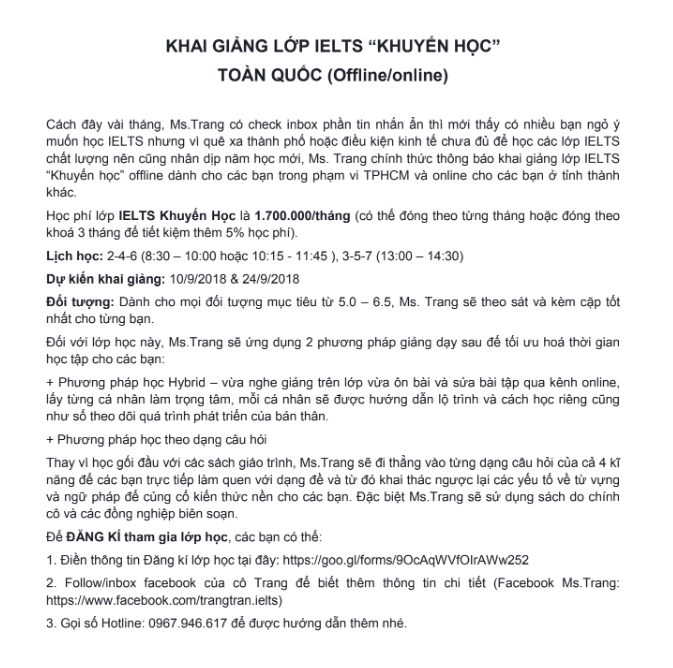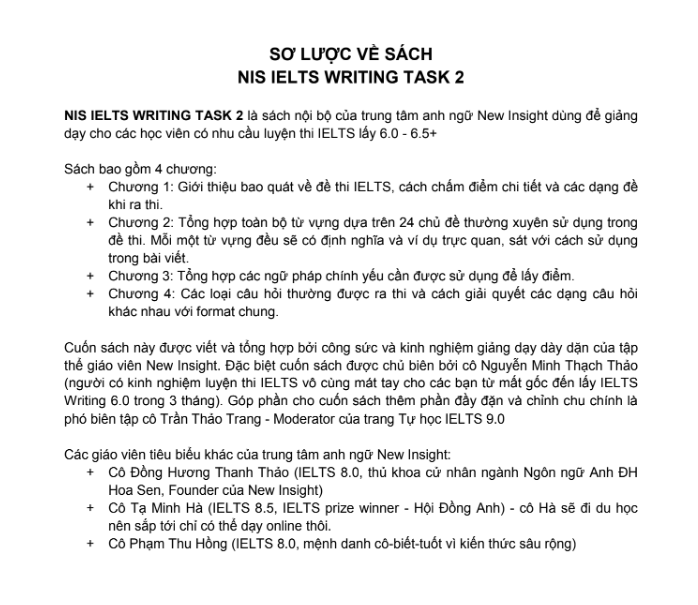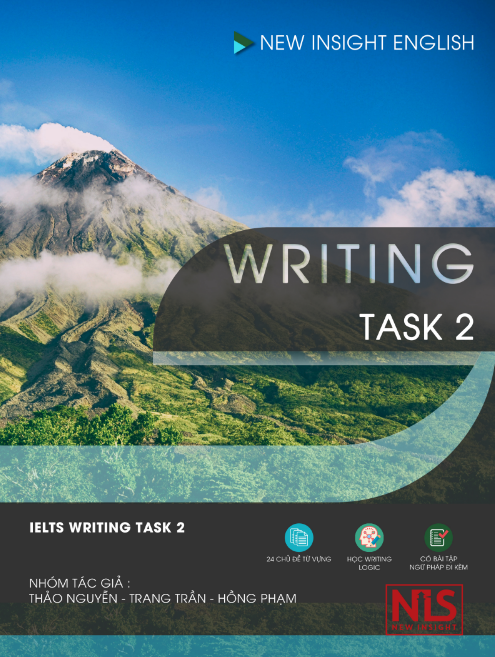


Mục lục
ToggleMỤC LỤC
CHAPTER 1: INTRODUCTION ………………………………………………………………………………….. 1
CHAPTER 2: TOPICS ………………………………………………………………………………………………. 8
I. Advertising ……………………………………………………………………………………………………………. 8
II. Animal Rights ………………………………………………………………………………………………………. 10
III. Cities …………………………………………………………………………………………………………………… 15
IV. Crime ………………………………………………………………………………………………………………….. 17
V. Education …………………………………………………………………………………………………………….. 21
VI. Environment ……………………………………………………………………………………………………….. 28
VIII. Gender ……………………………………………………………………………………………………………… 32
IX. Genetic Engineering ……………………………………………………………………………………………. 34
XI. Government and Society …………………………………………………………………………………….. 38
XIII. Health ………………………………………………………………………………………………………………. 41
XIV. Housing and Architecture …………………………………………………………………………………. 44
XV. Language …………………………………………………………………………………………………………. 45
XVI. Money ……………………………………………………………………………………………………………… 46
XVII. Personality ……………………………………………………………………………………………………… 47
XVIII. Sport and Leisure ………………………………………………………………………………………….. 48
XIX. Television, Internet, Phones ……………………………………………………………………………… 50
XX. Tourism ……………………………………………………………………………………………………………. 53
XXI. Traditional vs Modern ……………………………………………………………………………………… 54
XXII. Transport ……………………………………………………………………………………………………….. 55
XXIII. Water ……………………………………………………………………………………………………………. 57
XXIV. Work …………………………………………………………………………………………………………….. 59
CHAPTER 3: GRAMMAR ………………………………………………………………………………………… 63
I. Conditionals …………………………………………………………………………………………………………. 63
II. Gerunds, Participles, and Infinitives ……………………………………………………………………… 67
III. Inversion …………………………………………………………………………………………………………….. 69
IV. Paraphrasing ……………………………………………………………………………………………………….. 74
V. Relative Clauses …………………………………………………………………………………………………… 77
VI. Sentence Types …………………………………………………………………………………………………… 83
VII. So, Such… That ………………………………………………………………………………………………….. 91
VIII. Tenses ………………………………………………………………………………………………………………. 93
IX. The Comparative – The Superlative ……………………………………………………………………. 101
X. The Passive Voice ………………………………………………………………………………………………. 108
CHAPTER 4: IELTS TYPES OF QUESTIONS ……………………………………………………….. 114
CHAPTER 1: INTRODUCTION
Kì thi IELTS bao gồm 4 kỹ năng: Nghe, Đọc, Viết và Nói, được chia thành 2 dạng là Academic và General Training.
- Academic: dành cho đối tượng học sinh, sinh viên mong muốn học bậc đại học, sau đại học hoặc đáp ứng yêu cầu công việc.
- General Training: dành cho đối tượng mong muốn định cư ở các quốc gia nói tiếng Anh.
Trình tự bài thi
| Phần thi | Nội dung | Số câu / thời gian | Ghi chú |
|---|---|---|---|
| Listening | 4 sections | 40 câu – khoảng 30 phút | |
| Reading | 3 sections | 40 câu – 60 phút | |
| General Training Reading | 3 sections (2 section đầu gồm 2 bài đọc ngắn, tổng 5 bài đọc) | 40 câu – 60 phút | |
| Academic Writing | 2 tasks (Task 1: mô tả biểu đồ; Task 2: viết bài nghị luận) | 60 phút | |
| General Training Writing | 2 tasks (Task 1: viết thư; Task 2: bài nghị luận) | 60 phút | |
| Speaking | 3 parts | 11–14 phút | |
| Tổng thời gian | 2 tiếng 44 phút |
Trong bài Writing Task 2, thí sinh phải viết một bài văn nghị luận dài ít nhất 250 từ về các chủ đề học thuật như giáo dục, môi trường, xã hội, v.v…
Thời gian khuyến nghị: 40 phút (trên tổng 60 phút của phần Writing).
Bài thi được chấm trên 4 tiêu chí:
- Task Response
- Viết đúng chủ đề và yêu cầu của đề.
- Coherence and Cohesion
- Trình bày, sắp xếp và phát triển ý tưởng mạch lạc, hợp lý.
- Sử dụng từ nối liên kết giữa các câu.
- Vocabulary (Lexical Resources)
- Sử dụng từ vựng phù hợp với chủ đề (topic vocabulary & collocations).
- Grammar
- Sử dụng chính xác và đa dạng các loại câu (đơn, phức, ghép) cùng các cấu trúc ngữ pháp khác.
Các tiêu chí chấm điểm Writing Task 2
| Band | Task Achievement | Coherence and Cohesion | Lexical Resource | Grammatical Range and Accuracy |
|---|---|---|---|---|
| 9 | Fully addresses all parts of the task; presents a fully developed position with relevant, well-supported ideas. | Uses cohesion naturally; skilfully manages paragraphing. | Uses a wide range of vocabulary with natural, sophisticated control; rare slips. | Uses a wide range of structures with full accuracy and flexibility; rare slips. |
| 8 | Addresses all parts; well-developed response with relevant, extended ideas. | Logical sequencing; cohesive devices used effectively; appropriate paragraphing. | Wide vocabulary; fluent, flexible; may have rare errors in collocation. | Wide range of structures; majority error-free; very occasional errors. |
| 7 | Addresses all parts; clear position throughout; ideas well-extended though may lack focus. | Logical organisation, clear progression; appropriate cohesive devices (some over/under-use). | Sufficient range for flexibility and precision; occasional errors in word choice/spelling. | Variety of complex structures; frequent error-free sentences; good control with few mistakes. |
| 6 | Addresses all parts though unevenly; presents relevant ideas though underdeveloped. | Coherent organisation; some mechanical cohesion; may lack clear referencing. | Adequate vocabulary; attempts less common words with some inaccuracy. | Mix of simple/complex sentences; some grammatical errors but meaning clear. |
| 5 | Addresses task partially; development not always clear; irrelevant details possible. | Some organisation but weak progression; inaccurate cohesive devices. | Limited vocabulary; noticeable spelling or word formation errors. | Limited structures; frequent grammatical errors; punctuation often faulty. |
| 4 | Minimal or tangential response; unclear position; repetitive or irrelevant ideas. | Little coherence; inaccurate cohesion; poor paragraphing. | Basic vocabulary; frequent word formation errors. | Very limited structures; frequent errors. |
| 3 | Does not adequately address any part of the task; few undeveloped ideas. | Illogical organisation; very limited cohesion. | Extremely limited vocabulary; severe distortion. | Frequent errors; meaning distorted. |
| 2 | Barely responds; no development. | Very little organisation. | Extremely limited vocabulary; no control. | Cannot use sentence forms except memorised phrases. |
| 1 | Completely unrelated to task. | No communication. | Only isolated words. | Cannot use sentence forms. |
| 0 | No attempt / totally memorised response. | – | – | – |
IELTS TYPES OF QUESTIONS
Có 5 dạng câu hỏi chính trong IELTS Writing Task 2:
| Types | Writer’s opinion | Question examples |
|---|---|---|
| Discussion | 0% | Discuss both views. / What are the advantages and disadvantages of this trend? |
| Discussion + Opinion | 50% | Discuss both views and give your opinion. / Do the advantages outweigh the disadvantages? |
| Opinion | 100% | To what extent do you agree or disagree? / Do you think this is a positive or negative trend? |
| Solution | ~ | What are the reasons/causes of this problem? What measures can solve it? |
| Two-part Question | ~ | What are the reasons of this trend? Do you think it should be changed in the future? |
Một số đề mẫu và đề đã ra thi
Discussion
- People now have the freedom to work and live anywhere in the world due to technology and transportation. What are the advantages and disadvantages of this trend? (IELTS Buddy)
- With the rise of e-books comes the decline in paper books. Some people see this as a good step forward, others do not. What are the advantages and disadvantages of this trend? (IELTS Liz)
- Space exploration costs taxpayers an exorbitant amount of money each year. What are the advantages and disadvantages of spending money on space exploration? (IELTS Liz)
Discussion + Opinion
- (07/04/2018) Some people think government funding should not be used for supporting art and culture; others believe it benefits society. Discuss both views and give your own opinion.
- (03/03/2018) Some people think new houses should follow local architectural style, others think people should have freedom to design their own. Discuss and give opinion.
- (20/01/2018) Research shows that business meetings and training are happening online. Do the advantages outweigh the disadvantages?
Opinion
- (26/04/2018) Public money should be spent on promoting a healthy lifestyle rather than treating illnesses. To what extent do you agree or disagree?
- (21/04/2018) Organised tours to remote areas are becoming popular. Is this a positive or negative development?
- (24/03/2018) Museums should focus on their own country’s history rather than works from other parts of the world. Agree or disagree?
- (03/02/2018) The only way to improve road safety is to give stricter punishments for driving offences. Agree or disagree?
- (01/02/2018) Scientific research should be conducted by governments, not private companies. Agree or disagree?
- (07/01/2017) Some universities offer online courses as alternatives to on-campus classes. Is this positive or negative?
Solution
- (04/11/2017) It is difficult for city people to get enough physical exercise. What are the causes and solutions?
- (16/09/2017) Students leave school without learning money management. Causes and solutions?
- (15/07/2017) Animal species are becoming extinct due to human activities. Causes and solutions?
- (14/01/2016) Many museums are mainly visited by tourists, not locals. Why? How to attract locals?
- (29/10/2016) People prefer imported food over local food. Why? What can encourage local consumption?
Two-part Question
- (24/02/2018) Employers value academic qualifications more than life experience. Why? Is this positive or negative?
- (10/02/2018) The tradition of family meals is disappearing. Why? What are the impacts?
- (13/01/2018) People in large cities face several problems. What are they? Should governments encourage moving to smaller towns?
- (15/12/2016) Scientists believe children’s early behaviour predicts future criminality. To what extent is crime a product of human nature? Can it be prevented?
Một số lỗi cần tránh trong bài viết Task 2
1. Thiếu chữ (Underlength)
- Thí sinh nên viết 260–280 chữ trong Task 2.
- Bài dưới 250 chữ có thể bị trừ ≈ 0.5 điểm / 9.0.
| No. of words | Penalty |
|---|---|
| < 250 | -0.5 / 9.0 (ước tính) |
2. Các lỗi khác
- Lạc đề (Off-topic): câu trong bài không liên quan chủ đề.
- Học thuộc lòng (Memorised): bài chép sẵn, không được chấp nhận, có thể bị 0 điểm.
- Chữ mờ, khó đọc (Illegible): bị trừ điểm nếu giám khảo không đọc được chữ viết.



